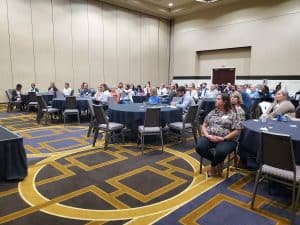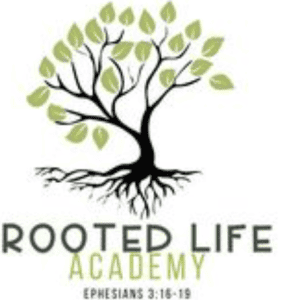Micro schools are the reimagining of the one-room schoolhouse, where class sizes are usually fewer than 15 students of varying ages, and the schedule and curriculum is tailored to fit the needs of each class. Also called “learning pods”, this model of schooling can operate in either public, private or charter schools or separately on its own. Many describe micro schools as a “mid-point” between traditional schooling and homeschooling. Most micro schools are independently parent-led, but some are affiliated with a formal network of micro schools offering paid, in-person instructors. Lessons are taught in a range of approachable environments, such as homes, libraries and other community centers.
Hybrid schools utilize a combination of in-school and at-home learning, but there can be much variety in how they are structured. Students may meet in person two days and learn at home three days, or the other way around. Some hybrids meet half days in person, while the rest of  the time is spent at home.
the time is spent at home.
The definitions of hybrib and microschools are not mutually exclusive, and one can be the other in an education program.
The creative alternatives to public school learning were discussed in a recent summit of microschool educators, two of whom are Kansans; Dalena Wallace, founder of the Wichita Innovative Schools and Educators (WISE) from Partridge in Reno County, and Becky McNichols, creator of Rooted Life Academy in Spring Hill in Johnson County.
We asked each a series of questions about their experience with micro schools and the hybrid format:
What model did you use to begin your program?
Becky: “Rooted Life Academy is a faith based homeschool enrichment program for children kindergarten through 4th grade. When I created Rooted Life Academy, I wanted to design a program that would fit the needs of my family knowing that what I wanted for our family was also things that other families around this area wanted for theirs. We wanted our children to grow in their faith, we wanted more family time,  more flexibility, more individualized and personalized instruction, more hands-on learning, more learning experiences shaped by children’s interests, more access to high quality instruction, and a small class size. We wanted our children to learn among different aged peers. All of those aspects came into creating Rooted Life Academy in a way that fits the needs of families and offers a deep enrichment of the development of children where they are at and also takes into account the individuality of each child.
more flexibility, more individualized and personalized instruction, more hands-on learning, more learning experiences shaped by children’s interests, more access to high quality instruction, and a small class size. We wanted our children to learn among different aged peers. All of those aspects came into creating Rooted Life Academy in a way that fits the needs of families and offers a deep enrichment of the development of children where they are at and also takes into account the individuality of each child.
“We provide options for families to enroll in 1-4 days a week Monday through Thursday depending on their schedule. Parent partnership is incredibly significant and I wanted our schedule to allow families to be able to choose what best fit their needs while also allowing for Fridays off to have extra time together too.
“With my background as a public school teacher for 15 years, I have experience in differentiating to meet the needs of students. That’s been an incredible asset for what we do at Rooted Life Academy as I believe it is so important to build foundational skills, fill in gaps, and continue to build momentum for a child’s success, confidence, and application of skills. I’m teaching students where they are at, working to fill gaps or holes, moving on at a pace that suits their needs, and finding what works best for them and their learning styles. We have devotionals, reading, phonics, writing, math, and science and social studies. The children get to collaborate with peers of different ages, they get opportunities to make decisions about what works best for them or what activities to do when, what work to work on first, even where they want to sit, lay, or stretch out to complete their work. We have no desks!! Only flexible seating! We play outside each day, getting ample fresh air, exercise, and playtime, while also getting to tend to the chickens – some of which we hatched while learning about North American Birds last year!
 “I communicate daily and share pictures with families to let them know what we’ve been working on: what phonics patterns we’ve learned, how to help their child continue to develop the math skill we just introduced, what cool and interesting discoveries we’ve made during our science unit, what social skills we’ve been working through, and so much more. I find that to be incredibly beneficial – the parents know exactly what we are doing and it makes a cohesive way to connect what we learn here with things they are doing at home too!”
“I communicate daily and share pictures with families to let them know what we’ve been working on: what phonics patterns we’ve learned, how to help their child continue to develop the math skill we just introduced, what cool and interesting discoveries we’ve made during our science unit, what social skills we’ve been working through, and so much more. I find that to be incredibly beneficial – the parents know exactly what we are doing and it makes a cohesive way to connect what we learn here with things they are doing at home too!”
Dalena: “We were a group of homeschool families that started meeting in my home about 7 years ago, grew into a co-op serving about 40 students in a church-owned school building. A few of us also explored the Prenda microschool model and went on to develop our own style of microschooling. Today my kids attend ReWild Microschool one day a week and then attend classes with the larger community of homeschoolers another day of the week.
What have been the parents’ reactions to micro schools?
Becky: “Parents have loved being a part of this kind of learning opportunity. They see their child happy, excited to come everyday, making deep friendships, applying their learning, and remembering new concepts in fun and memorable ways. When we learned about North American Birds, families noticed their children identifying birds while out and about, whether from the markings and features of the birds or by the sounds and calls they heard. Parents see their children reading – FOR FUN! They notice their child doing mental math with ease. They see their child experimenting with concepts we learned during our Simple Machines unit – a unit I wrote to engage students in seeing and understanding how simple everyday things come down to 6 simple machines!
“The families have been very supportive in this journey. They love the small class size, the attention to detail, the intentionality that goes into the way the program was designed as well as the everyday details too. Since we don’t have sessions on Friday, periodically I plan field trips or activities (usually tied to our learning) for Fridays where parents bring their own children and we participate together – building community. While the parents see their child thriving academically, they see their child grow socially and emotionally too – the students are all great friends. We work through common social and emotional interactions together and we often get immediate practice to grow through these topics!”
Dalena: “They welcome the help as they are homeschooling their own kids. Love the time to learn together. Sometimes they offer to teach classes and other times they are more in favor of hiring other qualified teachers from the community. Either way, they appreciate sharing the load of teaching with others.”
Have you seen academic improvement among your students so far?
Becky: “The students have made incredible academic improvement! I’ve seen a number of students come with few phonics, reading, and math skills who are flourishing in those areas! Likewise, I’ve seen children who come in saying “I don’t like reading” or “I don’t like math” who now say “I LOVE READING!” and “I LOVE MATH!!” Some of them even ask for MORE reading or math! While I’ve seen academic improvements for each child, I’ve also seen huge improvements for self-awareness, responsibility, social and emotional skills, critical thinking, problem solving, reasoning, and so much more. I see children who are interested in the world around them, who want to investigate new things and apply that learning right away. I see older kids who are helping to mentor younger children. We love having each other share about things that they’ve been doing at home too.
“We love celebrating the things they have done whether it be getting a trophy for fishing or wrestling tournaments, a project they worked on about a sea animal, a place they visited on vacation, or even a museum they went to recently. I love how this has fostered the students’ abilities to learn from and teach others – no matter the age.”
Dalena: “As far as achievement goes, across the board, students are improving in their abilities and growing in their knowledge. They are not on the same ‘fast track” that traditional schools are on. They are taking their time, making sure that they have mastery before moving on to higher levels but they are all progressing which is what parents mostly care about. The overall growth in emotional, mental and social health seems to be just as important for parents to see in their children.”
Final thoughts?
Becky: “There are a lot of different options in our area and I think each one offers an incredible and creative design to help children learn and grow. I think it’s important that parents have these options especially as more families are leaving the public school system. I know many families who are homeschooling their children but also want a place where their child can interact with others and learn together – these options help partner with parents to deliver that kind of opportunity. The diverse range of options we have in our area is fantastic and I believe it’s only going to grow and improve! I know that my program might not fit the needs of every family that reaches out to me – and that’s okay. I don’t mind helping direct families to programs that might better fit their families’ needs. I think it is important within this movement to celebrate the unique, innovative, and creative designs that these programs offer! I am blessed every single day to get to do what I do – especially to pour into the lives of my own children and the other children I am lucky enough to serve!”
Dalena: “Hybrid and microschools are helping to fill the void for families that are unable to homeschool but are still seeking an individualized learning environment for their students. This movement is meeting a need in a way that conventional, larger, five day a week schools are unable to and parents want to see more of these types of educational models develop. There is a great need for more of these innovative schools.”
Additional information on micro schools and hybrids is available at the National Hybrid Schools Project at Kennesaw State University.



